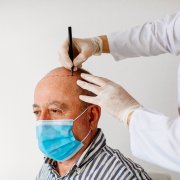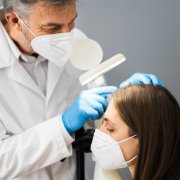Talking to a Hair Doctor About Androgenic Alopecia in Men
Androgenic alopecia is a very common genetic condition that causes progressive hair loss in both men and women. As its name implies, the condition is said to be linked to the overproduction of androgen, a hormone responsible for hair growth. The excess leads to the weakening and shrinking of hair follicles.
When androgenic alopecia occurs in men, it is commonly referred to as male-pattern baldness. It is a reality that approximately 50 million men in the United States have had to face to some extent. While it may not be any cause for concern for some, there have been multiple studies that show that it does have damaging effects on a man’s self-esteem and feeling of self-worth.
If you’ve noticed your hairline receding in an M shape and you’re starting to get distressed about it, it helps to consult a doctor. This way, you will be able to figure out what can be done to stop its progression, which can have a negative effect on your self-esteem. Here are some tips for you to consider when consulting a hair doctor about androgenic alopecia.
1.) Anticipate questions about your condition.
At some point during your appointment, your doctor may have relevant questions for you. Your answers will give your hair doctor an insight into your health history and current state of health. Here are some of the questions your hair doctor may ask you:
- Is this the first time you’ve experienced hair loss?
- Has there been anyone in your immediate family who’s experienced the same problem?
- When did you start noticing it?
- What medications are you on?
- Has there been anything that happened in your personal life (or your job) that has brought you significant stress?
2.) Prepare for a physical exam and diagnostic test/s.
After reviewing your medical history, your hair doctor will conduct a thorough evaluation to identify the pattern and distribution of your hair loss and the quality of your existing hair. Your doctor will also examine your scalp for inflammation, redness, or scarring.
Your doctor will perform diagnostic tests, such as a pull test (to determine the severity of hair loss) and scalp counts (to determine the cause of hair loss). Blood work may also be required to identify any medical conditions, vitamin deficiencies, and other factors that could have contributed to your hair loss.
3.) Discuss the treatment options.
You may be in a hurry to end your hair loss ordeal, but it always proves prudent to explore all of the possible treatment options to see which one is most suitable for your condition.
Medications that effectively treat hair loss caused by high levels of DHT—a derivative of the androgen hormone—are usually the first course of treatment. This method may be supplemented by nonsurgical approaches such as low-level laser therapy, platelet-rich plasma (PRP) therapy, and stem cell therapy. Taking the time to discuss each of these options and their benefits and side effects with your hair doctor will help you make an informed decision.
There are also surgical procedures to treat male-pattern baldness, among which is hair transplant surgery. Check with your doctor if you’re a good candidate for this procedure.
Hair Doctor in Kansas City and Liberty, MO
Don’t let hair loss get the best of you. Consult our very own highly skilled hair transplant surgeon, Dr. Scott Darling at Darling Hair Restoration. He specializes in diagnosing and treating hair loss and scalp disorders, and he will help you regain your self-esteem —just as he has been doing to dozens of our patients over the past two decades. He’ll explain the surgical and nonsurgical hair loss treatment options we offer and the cost of each, so you can choose an effective solution that fits your budget.
To schedule a consultation with Dr. Scott Darling, call our Liberty office at (816) 792-3400 or request an appointment online.










